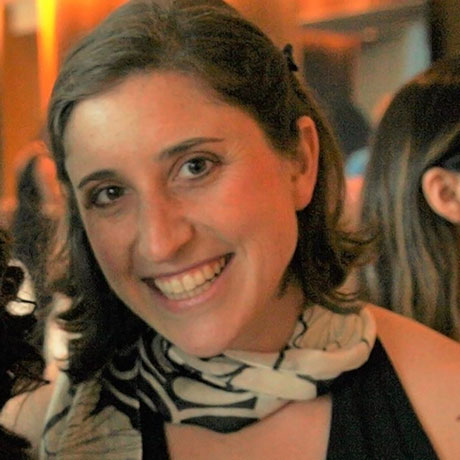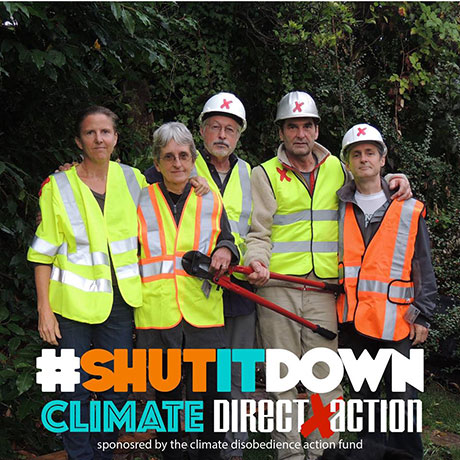
Honest, paywall-free news is rare. Please support our boldly independent journalism with a donation of any size.
On October 11, 2016, award-winning documentary filmmaker Deia Schlosberg was arrested in North Dakota while filming an activist with Climate Direct Action as he turned off a TransCanada oil sands pipeline crossing from Canada into the United States. It was one of five actions that shut down all pipelines carrying tar sands into the U.S. from Canada that day.
In an exclusive interview with DeSmog, Schlosberg shares her experience, including what it’s like being a reporter facing felony accounts with a potential maximum sentence of 45 years, her reaction when Edward Snowden tweeted about her, and a message for other journalists covering climate change and the oil and gas industry.
“I did not ever intend to be the story. It’s safe on this side of the camera usually,” Schlosberg told DeSmog.
What follows is our Q&A with Schlosberg, which has been edited slightly for clarity and length.
First, how are you doing these days?
I am doing OK, trying to not get completely overwhelmed. It’s a lot to absorb in a short time period.
You’ve mentioned receiving an outpouring of support since your arrest. What’s that been like?
 Activists who shut down tar sands pipelines on October 11, 2016. (Photo: Shut It Down – Climate Direct Action / Facebook)I feel very loved and supported. I’m also not somebody who’s a fan of a lot of attention or being on the sharp end of the camera. I’m constantly talking myself up into wanting to use this platform that I now have to talk about what I was originally reporting on.
Activists who shut down tar sands pipelines on October 11, 2016. (Photo: Shut It Down – Climate Direct Action / Facebook)I feel very loved and supported. I’m also not somebody who’s a fan of a lot of attention or being on the sharp end of the camera. I’m constantly talking myself up into wanting to use this platform that I now have to talk about what I was originally reporting on.
This all started October 11 when you were documenting an act of civil disobedience by activists shutting down TransCanada’s Keystone pipeline in Walhalla, North Dakota.
However, you were not participating in the action. You were documenting it as a filmmaker and climate journalist?
Yes, yes, yes.
What was it like being there that day?
In general, I felt like this was an extremely important action to document because it was unprecedented — shutting down all of the oil sands coming into the U.S. from Canada. And as a climate reporter and someone who worries about the impacts of climate change and our future, I know that the Canadian oil sands are a pretty scary source of energy to be exploiting at this point.
What was going through your mind?
What I can say is that, in general, the people putting their own lives on the line to stand up to the fossil fuel industry and to fight for a more humane future for everybody on the planet is inspiring.
Can you talk about what happened after you were arrested?
The police told me I was under arrest for being an accessory to a crime and they seized all of my camera gear as evidence. Then we drove to the county jail in Cavalier. And I waited for a long time in the visitation room while they booked the two men who were arrested at the same time as me. They got all my info, fingerprinted me, gave me the orange jumpsuit, and put me in a cell.
I was the only woman in the county jail so I was alone. I ended up spending 53 hours in jail. Toward the end of that, we were arraigned and read our charges. My charges were three counts of conspiracy, which are all felonies.
The charges were conspiracy to theft of property, conspiracy to theft of services, conspiracy to tampering with or damaging a public service.
Obviously, there’s no way those are going to stick to me because, I mean, the First Amendment. They just can’t.
But even those charges brought against [the climate activist and support person shutting down the pipeline] Michael and Sam don’t make sense. Theft is intent to take something and neither of them intended to take anything or steal property or a service. And then the third one, public utility — it’s a TransCanada pipeline, and TransCanada is a company. The pipeline is carrying the dilbit or the syncrude to refineries, after which it’s put on the global market, after it’s refined and turned into a product. But the pipeline that was going through Walhalla, North Dakota, owned by TransCanada, is not a public utility.
When are you facing your charges in court?
I’m scheduled November 7 for a preliminary hearing.
And at that point the judge will decide whether there’s enough evidence to proceed with a court case?
Yeah, exactly.
I presume you’re taking an innocent plea?
Yes, I did not break a single law. I am 100 percent confident in that fact.
Are you feeling apprehensive about the case despite that?
I feel a lot better now after talking to my lawyer. I do feel a lot better about my situation, but it’s still not a comfortable place to be, having charges against me, things I didn’t do.
How did you feel when former NSA contractor Edward Snowden tweeted in support of you, pointing out that he only faces 30 years compared to your maximum potential sentence of 45 years?
I was surprised to see he tweeted about me. He makes a really good point. I mean that’s the absolute max that goes along with that felony, but there’s no way that that can stick. It just doesn’t make any sense. It was certainly scary at the beginning. Looking at charges that add up to 45 years, it’s pretty terrifying.
Why do you think North Dakota is pressing such serious charges against you and also against the climate activists you were filming?
I really don’t know why they decided on such heavy charges. For me, I understand the arrest because they didn’t know what was going on at the time. They didn’t understand the story and the situation. So I can understand them bringing me in initially, but once they found out I was media, I don’t understand why they charged me like they did.
As for Michael and Sam, I don’t know if it’s because, North Dakota is in a state of emergency right now with militarized police forces from 10 other states present around Standing Rock at the moment. They’re certainly on high alert and on guard and probably wanting to give themselves the option to have the charges be as severe as possible. I don’t know what their intentions are down the road, but this gives them whatever options they might want to pursue.
But there are also two filmmakers in Washington state who were also facing preliminary felony charges, which also carry maximum sentences of multiple decades.
Yes, Lindsey Grazel was one of those documentary filmmakers arrested for filming a parallel act in Washington. She reported that after being arrested and having her footage confiscated, she was strip-searched and held in jail for 33 hours before being released on bail. Democracy Now! has reported that Dakota Access pipeline protesters faced similar treatment upon arrest for minor charges in North Dakota.
What kind of message does this treatment of journalists and nonviolent activists send?
Whether they’re intending to send that message or not, the message they’re sending is one of hostility.
Despite the differences in the charges, does the news about Democracy Now! reporter Amy Goodman’s riot charge being dropped offer you any encouragement in your own case?
Definitely.
Have you been able to continue working through all this?
I would like to but it’s been just totally nonstop. There are also potential legal consequences at this point of me reporting. There are certain things that I can’t really talk about so I wouldn’t be reporting in a way that I’d want to.
And they [North Dakota law enforcement] still have a lot of my footage.
Have they turned over any of it?
None of the footage that they’ve confiscated. They only turned over the gear. I could have gotten the footage back but I would have had to sign a release for them to make digital copies that they could search. So I left the [memory] cards with them.
Are you currently working on any big projects?
I’m still very much working on getting How to Let Go of the World and Love All the Things Climate Can’t Change out there and doing screenings and distribution stuff for that film. I’m just starting to research and dive into some ideas for my next big project, but that said, if there are things happening in the world that I feel are important and not being covered that I could report on, that I could make into a short, I am always looking for stories that I think need telling.
Do you have anything to say to journalists covering the oil and gas industry in the face of such extreme charges?
I’d say make sure you’re following the law and keep doing your job. Keep being brave and reporting on the important things that are happening. It’s scary, but I think it’s more important than ever that anything related to human rights and climate change is reported.
Thanks for speaking with us today.
I have a lot of respect for DeSmog. You guys do good stuff.
Media that fights fascism
Truthout is funded almost entirely by readers — that’s why we can speak truth to power and cut against the mainstream narrative. But independent journalists at Truthout face mounting political repression under Trump.
We rely on your support to survive McCarthyist censorship. Please make a tax-deductible one-time or monthly donation.